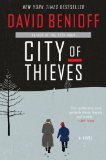Summary | Excerpt | Reading Guide | Reviews | Beyond the Book | Read-Alikes | Genres & Themes | Author Bio

Critics' Opinion:
Readers' Opinion:
First Published:
May 2008, 272 pages
Paperback:
Apr 2009, 272 pages
 Book Reviewed by:
Book Reviewed by:
Kim Kovacs
Buy This Book
This article relates to City of Thieves
The Siege of Leningrad (September 1941 - January 1944) was one of the longest and most destructive in modern history - spanning 900 days and four Russian winters. Though the actual civilian death toll can never be known it is estimated that well over 600,000 of the approximate 3 million population died, with some estimating the death toll as high as 1.5 million. About 80% died of starvation.
When the siege began, the city had approximately 30 days' worth of food on-hand. Rationing began almost immediately, but Leningrad's citizens weren't informed how low supplies truly were, presumably to keep them from panicking.
Restaurants continued operating as normal for quite some time, and families didn't realize conservation was necessary until after food became scarce.
As food supplies were depleted, residents began preying on cats, dogs, rats and pigeons, until no more could be found in the city. By mid-November 1941, just a couple of months into the siege, the daily death toll was somewhere around 350, rising to 1600 per day by the end of December. The bitter cold of the Russian winter (-40°C/-40°F) added to the casualties; people were too undernourished to withstand the frigid temperatures.
The main staple became "bread" baked from anything that could reasonably approximate flour. Rye flour was used at first, but this soon ran out, so oats were substituted. When oats became impossible to obtain, it was replaced by malt. Ultimately the bread was made with a combination of cottonseed, cellulose and sawdust. The ingredients lacked significant nutrition but were, at least, still plentiful.
Anything made from leather was consumed, even the glues from picture frames and the spines of books provided some sustenance. It is said that cannibalism saved many from starvation.
The Russians were able to re-establish a railroad link to Leningrad on December 9, 1941, and were consequently able to provide some relief to the city. In addition, supplies were transported over frozen Lake Lagoda (map).
These lifelines, however, could not provide adequate provisions for the remaining residents who, it is estimated, received only 10% of the calories needed to sustain them through that first winter, and the winters that followed.
By January 1944, the Red Army had pushed the German army beyond Leningrad allowing the city to celebrate the end of the siege. The human toll of the siege is well-documented in many accounts written at the time. One of the most poignant
is the diary of a young girl, Tanya Savicheva. Tanya was the youngest of five children, with sisters Tanya and Nina and brothers Mikhail and Leka. Her diary, just six pages, contains only the
following:
Jenya died on 28th Dec. at 12.30 AM 1941.
Grandma died on 25th Jan., 3 PM 1942.
Leka died on 17th March at 5 AM 1942.
Uncle Vasya died on 13th Apr. at 2 o'clock after midnight 1942.
Uncle Lesha on 10th May at 4 PM 1942.
Mother on 13th May at 7.30 AM 1942.
Savichevs died. All died. Only Tanya is left.
Tanya's brother Mikhail wasn't in Leningrad when the siege began, and her sister Nina was evacuated without the knowledge of her family. Tanya was consequently completely alone after the death of her mother. She was eventually evacuated from the city, but her body could not recover from the extreme malnutrition it endured. She died on July 1, 1944. Her diary was presented by the prosecution at the Nuremburg Trials as evidence of Nazi atrocities during the war.
Interesting links:
Filed under People, Eras & Events
![]() This "beyond the book article" relates to City of Thieves. It originally ran in September 2008 and has been updated for the
April 2009 paperback edition.
Go to magazine.
This "beyond the book article" relates to City of Thieves. It originally ran in September 2008 and has been updated for the
April 2009 paperback edition.
Go to magazine.





The House on Biscayne Bay
by Chanel Cleeton
As death stalks a gothic mansion in Miami, the lives of two women intertwine as the past and present collide.

The Flower Sisters
by Michelle Collins Anderson
From the new Fannie Flagg of the Ozarks, a richly-woven story of family, forgiveness, and reinvention.

The Funeral Cryer by Wenyan Lu
Debut novelist Wenyan Lu brings us this witty yet profound story about one woman's midlife reawakening in contemporary rural China.
Your guide toexceptional books
BookBrowse seeks out and recommends the best in contemporary fiction and nonfiction—books that not only engage and entertain but also deepen our understanding of ourselves and the world around us.